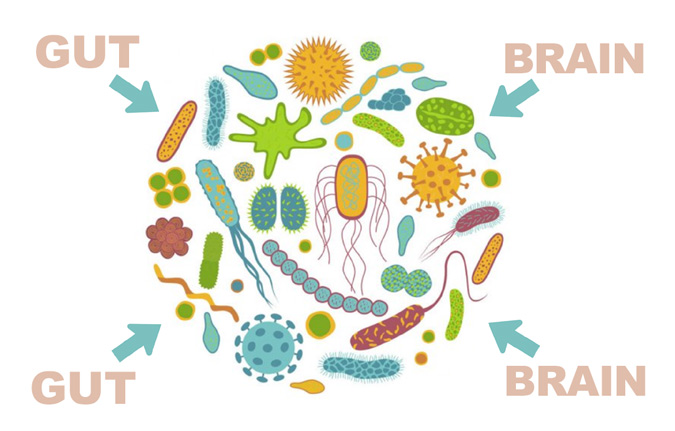The gut microbiome is the new frontier of neuroscience.
Due to the copious amount of research during the past decade, scientists now understand that bacteria in the gut affects a person’s overall physiology—including a vital link between that bacteria and the brain. This link is known as the “gut-brain axis.”
Now new research published in JAMA Psychiatry has tied all the earlier research together by demonstrating that a pattern of microbiome deficiency is present across different types of psychological disorders.
Brief history of recent research linking gut health to mental health
In 2013 the term “psychobiotics” was coined in a paper published in the journal Biological Psychiatry. At that point in time the term referred only to probiotics, or live microbes, that survive in the gut and have a metabolic effect.
In 2014 research published in Psychopharmacology showed that certain types of prebiotics tempered the effects of the stress hormone cortisol and balanced negative emotions in study participants.
Also in 2014, Norwegian researchers discovered a correlation between an abundance of certain bacteria—and the lack of other benefical bacteria—in the feces of depressive patients.
A 2016 large-scale review of psychobiotic research published in the journal Trends in Neurosciences warned that medical practitioners should consider the negative effects of antibiotics, antidepressants, and antipsychotics on gut flora—because changes in the gut microbiome itself can lead to psychological disorders
In 2017 the Journal of Psychiatric Research published findings from University of Michigan psychiatry department that found dramatic microbiome imbalances in stool samples of study participants with bipolar disorder compared to the participants in a control group.
Current study finds gut bacteria similarities across all disorders
The new study is not only a meta-analysis, but an “umbrella review”—a review of previous meta-analyses. The results, just published in September 2021, broadly connects the earlier studies in finding similar gut microbiota composition across different psychiatric disorders.
Depleted levels of strains of bacteria known to reduce inflammation (Faecalibacterium and Coprococcus) were found in all the major psychiatric disorders—depression, bipolar disorder, psychosis, schizophrenia and anxiety.
Meanwhile, enriched levels of an inflammation-promoting strain (Eggerthella) were consistently present.
“We found that there were very few distinct condition specific alterations. Instead, what we saw was conditions such as depression, bipolar disorder, psychosis/schizophrenia and anxiety had a similar pattern in changes of microbial abundance,” said Dr. Allan Young, Centre for Affective Disorders at King’s College London, and one of the research paper’s authors.
Young added that the findings provide hope for streamlining more effective probiotic treatments in the future. ”We are suggesting we can lump some of these disorders together in terms of the alteration in the microbiome, but that may allow further stratification and personalization in the future.”
Probiotics no longer villified by the mainstream medical community
One thing is for sure: There has been a 180 degree change in the “the science” involving probiotics.
Twenty years ago family practitioners were regularly berating any patient who “wasted money” on probiotic supplements in lieu of a pharmaceutical drug treatment. Today, though, it is difficult for them to ignore the research.
Numerous studies—including those listed above—have proven conclusively that a healthy gut microbiome is not only important for the immune system, but for almost all aspects of health. And this includes mental health.
Optimal Health Systems has long recognized the importance of maintaining an optimal microbiome, and offers a number of products containing multiple-strain probiotic blends. Click links below to learn more:
• Optimal Flora Plus
• 21-Day Blitz Challenge Package
• Exposure Protection Pak
• Natural Z Pak
• Optimal Defense
– – –
Sources: JAMA Psychiatry, NutraIngredients.com, Biological Psychiatry Journal, Psychopharmacology, Trends in Neuroscience, Journal of Psychiatric Research.


